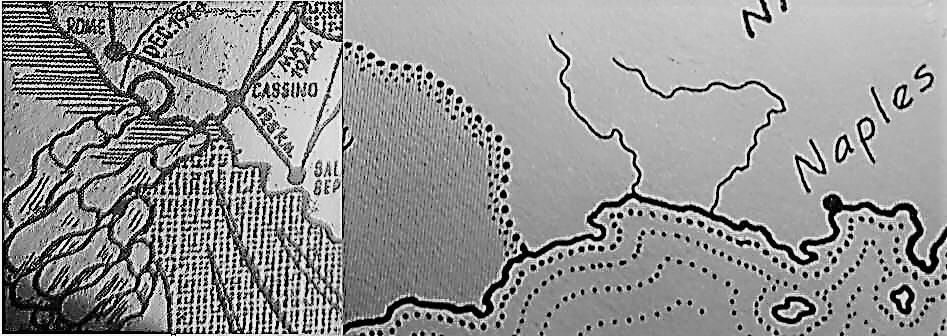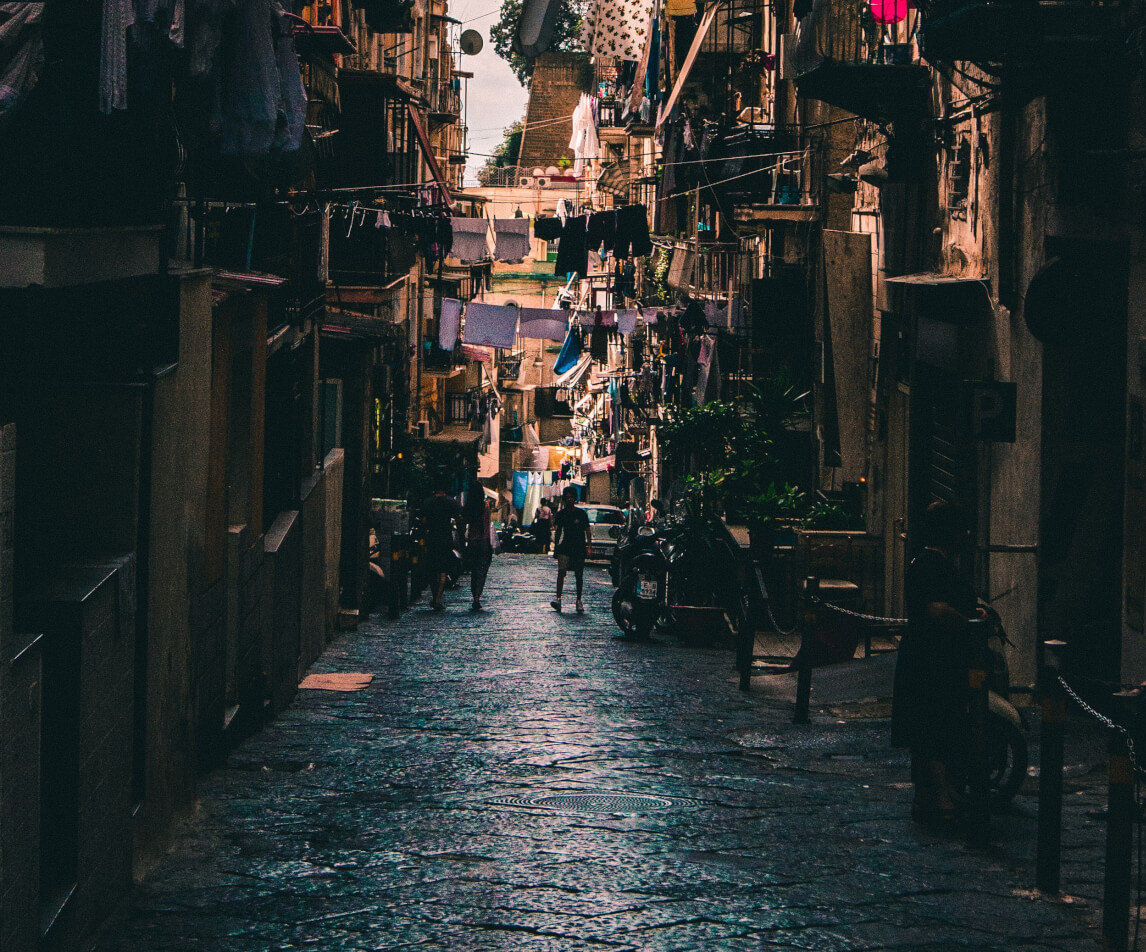By Jake Thomas Ferguson
The nice lady pleaded with me that I should stay in an albergo tonight and not on the streets. Her eyes lit up with a mother’s protective passion. Her little son eyed my travel gear curiously, not used to seeing people like me come through here. She knew I was telling her what she wanted to hear. Standing next to the water fountain in a dingy concrete plaza where folks come from all around to fill up bottles and glass jugs for home-use, I looked up the street I had come down earlier and almost shuddered now with sudden apprehension. The remains of a large factory building on the left side of the road with smashed windows must have many ways in, I thought, maybe I could squat there. Can’t I just go home with this mom and her son? I could teach him English and they teach me Napolitano, and we live happily together while the seasons come and go. I should just listen to her and find a hotel to stay in.
In the north of Naples where the Roman countryside seeps into the ancient Campania lives some sort of menace. This living darkness manifests itself in the Camorra-controlled extortion and fear campaigns that have settled over this landscape for decades. Clan members force thousands of small-business owners to buy products from them. Even the funeral processions have been taken over and all are forced to use the mafia’s services or risk death.
On every corner and every street for miles and miles you see abandoned properties and chained compounds which sit empty and decomposing. Even the street signs and mile markers are owned by the mafia. The closer you get to Naples you notice the mileage can’t be right. Reality and truth is another figment of our minds: anyone can be strong-armed into doing or believing anything as long as someone on the other end has the gun. On the road from Rome you can always hear the surf crashing on the shore, washing the blood from the beach like sins being forgiven in some dusty confessional.

Castel Volturno, Italy
The backpacking magic ended when I crossed the border into Campania and south to the infamous town of Castel Volturno, Italy. Just saying the name is enough to spark muted conversation and fear from those you meet. Castel Volturno. Here in Italy you can see thousands of undocumented immigrants living between the cracks of southern Italy’s already precarious infrastructure. With deteriorated social conditions back home in Benin City, Cameroon, Burkina Faso, Juba South Sudan, these migrants search for a better life and either find one or don’t. The first ones to get here already have the low-paying labor jobs and the new ones that come can only wander. Anyone you meet on these grey streets seems to be running from something.
The Odyssey describes this coast as some fantastic universe inhabited by gods, magic, and monsters where sailors failed to even recognize the stars. Making my way to the city on the Domiziana highway I came across a memorial plaque for an African who was gunned down on the sidewalk by the mafia in a power struggle between gangs. A Nigerian named Jon explained his situation to me. “Where I come from we can’t do this, the borders make it impossible for me to travel like you do now. Why do you do dees?” He asked with a smile. I didn’t know what to tell him other than saying we travel because we can. We travel because we are more fortunate. We have the money to throw around and don’t have to fight to survive, so we essentially have nothing better to do.
Life is tough here on the road between Africa and Europe, in Castel Volturno, between a better life and yesterday in Italy. All this talk I was hearing about the bandits and danger on the streets at night almost got to me. I would be walking through the cursed suburb and the largest outdoor sex market in Europe before stopping for the night. I would pass the black and white prostitutes lining the side of the two-lane road standing upright and as consistently placed as mailboxes.
Sometimes the ladies have a plastic lawn chair behind them or a mother figure never far away waiting in some car. These mother figures act as both pimp and protector to the girls. The rules will always be different here far away from the E.U. offices and bureaucrats in Brussels and Berlin. Italy has a history of incorporating and adapting the ruins of previous eras into modern life. How do the African and Eastern European prostitutes fit into that? Will they adapt or be forgotten, paved over and potentially unearthed in some future-scape where they might be celebrated in a world more hospitable? They won’t make the news but neither will I. We’re just inherently hopeful beings destined for a life of anonymity.
Most of us don’t see the poverty that exists between the airports and train stations. Those young girls working on the Domiziana will be standing there today whether I see them or not. I want to hear their story and the stories of these families and come quickly to the best humanitarian option possible. Can we get these girls some warm beds already! Can we please get some jobs for the young men as well?!
At least the abandoned properties should be officially opened up to house some of the squatters and most vulnerable. The migrants have been destined ghosts in their home countries and semi-ghosts in this adopted one. It makes me wonder why and how Westerners can feel unsatisfied by our lives even though we don’t have to avoid AK-47-controlled arbitrary checkpoints on sunbaked dirt roads in a sub-Saharan jungle.
All this time on the streets of little Africa was starting to open my eyes to something more beyond a tourist’s glance. How do we actually help these very real people beyond expressing our shallow pity and temporary sadness which gets us nothing but another young generation born into the enslaved and damned?
On the waterfront in Castel Volturno, Italy, as I was changing bike tires, a nice lady came out of her hair salon and insisted that I come inside and wash my hands. I declined because I never washed my hands just rubbed them on my jeans but she convinced me and I went inside. I spent more time cleaning the sink that I dirtied up. I left the backroom and past the sinks, mirrors, and black leather chairs, with a couple ladies wondering how this scruffy American stumbled his way here, I showed her my clean hands and thanked her for being too kind.
The sea from the port of Gaeta is either dazzling blue and green or a monotonous grey. There’s no more guns, heroin, and crime in broad day light here, we’re out of the city now, free from the mousetrap. Sometimes I’m lazy and sometimes I feel reborn on every street corner.
What if there’s no girl to go back home to? What should I be doing then! The sea is grey today and the rain isn’t coming down as hard as the first time I stopped here when I stood under a lone palm tree as some cold drops still found their way down to me. The little sail boats just out of sight rise like some vaporous fantasy. It carries my mind back through the centuries to a time when the only way to prove yourself was to journey to the boundaries of the known world, to defeat the monsters we couldn’t in real life. The gusts of wind keep me awake, alive. All I can say is that it’s been depraved. Sitting on the sand on the beach with no else around I sit and think about home or another coast.
Jake Thomas Ferguson is a 26-year-old traveler, writer, and photojournalist. With extensive travels in Korea, Mexico, and Southern Europe, he is always searching for stories where they might be missed. Connect with Jake at facebook.com/jaketferguson or email inquiries to jakefergusonuw@gmail.com.
Interested in visiting Rome? Try a Crypts, Bones & Catacombs Underground Tour, with “Walks,” who create alternative small-group tours for inquisitive and discerning explorers.
Do you like reading about experiential travel in Europe? Read Vanlife, Bikes, Verbier.
*This article contains affiliate link(s). Any affiliate link means that I may earn advertising/referral fees if you make a purchase through my link, without any extra cost to you. It helps to keep this magazine afloat and allows us to compensate our writers. Thank you for your support.*

